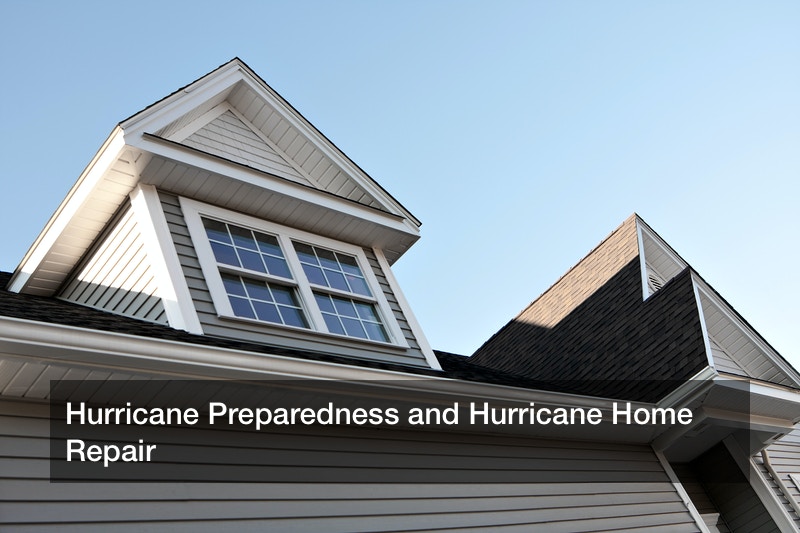
In the last decade about 158 named storms came out of the Atlantic which means the eastern seaboard has been pretty much battered, leaving a lot of people to deal with hurricane home repair. Hurricanes and other natural weather disasters cause billions of dollars in damage each year.
Hurricane home repair can range from simple roof repairs to disaster restoration services for a completely underwater home. What can you do to minimize the need for hurricane home repair if you are in the sights of a storm?
Preparedness is Everything in Dodging the Hurricane Home Repair Issues
While it is very true that in some cases, you have done all the preparation and you still wind up with hurricane home repair needs. In some cases, the best you can hope for is not whether you can prevent damages but minimizing those damages.
One of the key things you never want to do when you are preparing for a hurricane is risk personal injury to protect your home. Yes, your home is very important, but houses can be fixed, bodies may be less reparable. Do not risk life and limb to protect your home. If the authorities are ordering an evacuation, then evacuate and worry about the hurricane home repair after the storm.

If you have time here are the things you should do to prepare your home for a hurricane:
- Board up windows and glass doors. Boarding up the windows and glass doors will help to protect not only against the high winds but also against flying debris. Glass door replacement after the hurricane is easy to arrange but if you can avoid it you should.
- Bring in anything that can get caught up in the wind and become a danger. Lawn furniture and other yard items should all be brought in or at the very least secured down so that it can not become a projectile and cause property damage.
- If you live in a flood zone move treasured things to higher levels. Many Americans have experienced the heartbreak of losing highly sentimental items like old family photos in a flood. Move precious items that cannot be replaced to higher ground.
Other steps you should take include shutting off the propane tanks. If you have residential propane services for heating, shut down the tank. In the event the tank is damaged at least it will not be spewing combustible gas that can be a huge fire hazard.
Batten down all the hatches, make sure every window is boarded and locked and every door stays closed. Take a look around the house, if you notice loose siding, now is the time to fix it. A single loose piece of siding can easily be ripped away and take secured siding with it.
Using hurricane reinforcements for fencing, retention walls, and other structures can help to keep these structures safe during a hurricane. Taking precautions long before the hurricane shows up by using hurricane-proof structures and building techniques can help to keep your property prepared for bad weather long before it shows up.
Likely because there has been such an uptick in storms and the devastation that they cause, almost every type of building and installation for the home has some sort of hurricane-level installation option. Before you have things like HVAC installation done, speak to the contractor about what options are available to keep your system safe during hurricanes.
Paying a little extra to have hurricane-proof installation will pay off in the end. You can cut down on the need for hurricane home repair by making wise buying decisions if you live in a hurricane zone. Ask the HVAC contractor about how you can better protect your system from hurricane damage.
While you are at it consider asking a roofer about roofing options for your home that are designed to sustain high winds. Roofing damage is one of the top three damages sustained during a hurricane that require hurricane home repair. If you can offset some of the damages by choosing the right roof in the first place, you can save yourself some stress and get back to life faster after a storm.
Other Steps to Be Ready
Preparing the structure itself is not all you have to do to get ready for a storm. Invest in coolers and get some ice in case you lose power and you do not have a generator to keep your refrigerator and freezer running.
Start filling your bathtubs and other containers with water. If you live in a hurricane region, consider investing in refillable water tanks. Losing power and access to water after a hurricane is not unusual, as a matter of fact, it is usually par for the course. Taking steps to ensure that life in your household can continue while the powers that be get services back on line will reduce the stress.
Pack a bag with medications and important identification documents for the whole family. Have at least three days of clothing and personal care items tucked into the bag, just in case you need to evacuate quickly.

Set up a shelf in the basement or the garage with an emergency food supply. Canned food that can be quickly prepared will help when all the shops are closed after the hurricane. Knowing that you have what you need for at least a few days will help to keep feelings of panic at bay.
After the Storm
Once it is safe to go back home, you will want to take an assessment of the damages, and immediately call your homeowner’s insurance company. Keep in mind that your house is not the only house that has sustained damage and it may take a while for the insurance company to get to you.
It can be very tempting to start on the hurricane home repair before the adjuster comes out. In some cases, the insurance company is okay with this, in other cases, the insurance company wants to see the damage as is.
In cases of serious damage to the region you may find that running water and electricity is going to take a while to restore. You can stay in your home but you will have to make some arrangements to do so.
If you are in a hurricane region having a clean tank to store water can be a lifesaver if you lose access to water. Bulk water delivery can fill those tanks and keep them filled for just such an emergency.
If you planned well you may have a generator to use for electricity while they work on the lines, if you do not have a generator, you may have to rely on flashlights and candles. Do take care when using candles or your hurricane home repair worries may go up in smoke with your house.
There is going to be a mad dash of other homeowners trying to get hurricane home repair, it can be tempting to answer the knock of the storm chaser at your door that is offering repair services, be cautious. Be very cautious.
Every year during hurricane season you ready about these unsavory types that show up in these devastated areas with promises of quick clean up and repair that rip people off. They take the money as a down payment, sometimes quite a bit of money, and then they disappear never to be heard from again.
Yes, it is a very stressful time and you want to get the hurricane home repair done as soon as possible but you do not want to be ripped off. How do you choose a contractor to make the hurricane home repair that you need? Follow these tips:
- Take the time to vet any workers. Anyone that shows up at your door should have a business number you can call and contact. You want to be able to contact this person easily. A cell phone number is not enough.
- Research the company. Google the company, find reviews to read.
- If it sounds too good to be true it likely is. Be attentive to the pricing that is offered. If it is too low that is not a good sign.
Making decisions when you are upset is never a good idea. You become the perfect victim when you are overwhelmed and desperate. Keeping a cool head can help you to find the hurricane home repair companies that are not in it to rip you off.
Minimize the Damages

So your insurance company is one of those friendly, start the work without us checking types, you can still do things that will at the least minimize the damage. For example, if you lost some roof shingles in the storm, or sustained other roof damage, use tarps to cover the area. If it rains again, that rain will just pour into the house and cause even more damage if you leave it uncovered.
Start clearing debris from around the house. Pick up branches and limbs that have fallen and pile them away from the house. Your homeowners may cover cleanup costs but you have to live in the house in the meantime and you do not want to leave debris near the house where it can cause more damage and is a potential for injuries.
What about all that water that ran into the basement? Once the water has drained, get down there and start piling damaged goods in the center of the room away from walls. This will help the walls to dry out some and may slow down the growth of mold.
If windows are damaged, board them up until the adjuster gets there. You want to be sure that no one or nothing can get in and you also want to keep the elements out. Living with boarded-up windows may not be the best way to live but keep in mind it is only temporary until more permanent hurricane home repair can be done.
There are some things that you should not do if your insurance company has made it a caveat of not making repairs until your adjuster comes:
- Do not start ripping stuff up. Do not rip out the old flooring, or tear down damaged walls. It can be hard to look at your house like that but you want to ensure that the adjuster gets the “full picture” of what damages there are.
- Do not allow additional damage thinking that the insurance company will cover it. You are required to take steps to ensure no further damage occurs.
- Do not replace any appliances in the house. If your water heater was damaged or your other household appliances were damaged unfortunately you cannot replace them until the adjuster shows up.
Ultimately, if you do not mind the financial loss, you can do what you want when it comes to hurricane home repair, but do it knowing that if the adjuster shows up and you have a fistful of receipts for hurricane home repair that does not mean that the insurance company will cover the costs.
The insurance company will only cover what your policy is written for, and under the terms of your policy. If your policy states that they will not reimburse you for repairs made without the adjusters go ahead then they will not pay it out.
What Will Insurance Cover?

A lot of homeowners are not as familiar with their homeowner’s insurance as they should be. They are unfortunately very surprised to learn that what they thought would be covered for hurricane home repair is in fact not part of the plan. Being prepared for hurricane season means knowing what your policy will cover should your home sustain damages during the storm.
A big chunk of the damage will likely be covered if you have a comprehensive homeowner’s policy. If you do not, you may be able to tap into some of the funds that federal programs offer to disaster areas. A lot of people mistakenly believe that FEMA will take care of what their insurance does not, this is not always the case.
Familiarize yourself with your current insurance and whether or not you need to add some coverage long before the storm shows up. Most insurance companies will stop making changes to homeowners policies about a week before a storm is scheduled to make landfall.
Ultimately, hurricane home repair is stressful and upsetting, but as long as everyone has survived the storm, the repairs can be made. Stay safe and be prepared.



